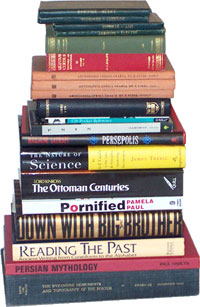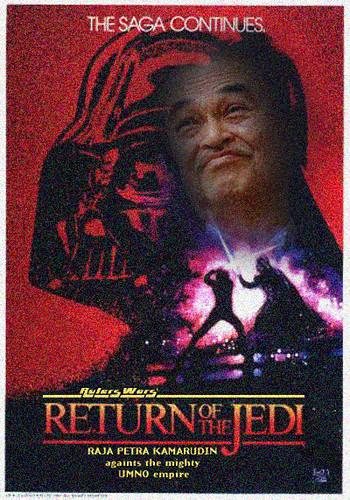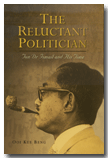
'The Rakyat' kept calling for
Raja Nazrin to be our next Prime Minister. Actually 'the rakyat' cannot just make anyone the PM of Malaysia. The rules say that the elected person, has to be the head of UMNO. How can we change the current leadership? Voting wisely this coming election? Changes within UMNO elite? Would it work?
Raja Nazrin had been making big hints about how things should be in several speeches already. The most remarkable being challenges and prospects for nation building: A lesson for the young and bright – his keynote address at the first Student Leaders' Summit on Aug 5.
The first, he said, is to recognize the Rule of Law and the inviolability of the Constitution, stressing that the supreme law of the land provides adequate checks and balances against excesses through the separation of powers between the executive, legislative and judicial branches, with each protected from encroachment by the other.
The second element he cited is economic and social justice for all. He said all groups in society, regardless of ethnic group, religion or gender, must participate in making decisions that affect their lives and livelihoods.
“The people we work and play with, the friendships we make must never be constrained by ethnicity."
“Preconceptions, parochialism and chauvinism can be eradicated if we interact actively with others of a different ethnic group or religion – even if it is just one teacher, one man, or one schoolmate. In many areas, this is absent and it must change,” he said.
The third vital essential highlighted by the prince is good governance. He said institutions of governance must show and generate norms and behaviour that are fundamentally efficient, productive and just.
“Only those who are capable, responsible and scrupulously honest should be allowed to serve in positions of leadership. The inefficient, incompetent and, most importantly, the corrupt, should be held in absolute contempt.”
“We must have leaders who are earnest in maintaining unity, never resorting to religious or ethnic posturing to further political careers at the expense of peace and security. Should they fail in this respect, they must be held accountable and answerable before the law.”
The prince also suggested several ways for young Malaysians to “tenaciously forge this nation”, beginning with getting copies of the Federal Constitution and familiarizing themselves with the rights enshrined in the document. He advised them to study the country’s history and former leaders like Tun Dr Ismail Abdul Rahman who dreamed of a nation without color lines, ethnic borders nor any group feeling a sense of inferiority. He told them to take “personal ownership” over the well being of the country, hold on to their ideals instead of giving way to apathy, cynicism or opportunism.
The prince urged the young to take active part in community services that promoted interaction among the races, serve the country to the best of their abilities and not shy away from working in the public sector.
Then in Sunday Star, former IGP
Tun Hanif Omar gets pretty vocal. Even the
Sultan of Selangor had his say in The Star.
Some excerpt from yesterday newspaper here in Singapore "The Straits Times"
[via:The Straits Times by Ooi Kee Beng]
ROYAL IMPACT: In a country where royalty is often silent, a vocal prince speaking about issues that interest the general public has been more than welcomed...The question that remains is: How far will he let himself go, and how far will he be allowed by the powers that be to go?
THE crown prince of Malaysia's Perak state,
Raja Nazrin Shah, holder of a Harvard University PhD in Political Economy and Government, has always been a respected personage in Malaysia, but never nearly as much as he is esteemed at present.
Why this is so is explained by his choice of issues in a series of speeches he has been giving recently, and by how his focus earns ready response among common Malaysians.
In a real sense, this love affair acts as a painful reminder of what it is that ails the present regime in 50-year-old Malaysia.
Perhaps this new phase in
Raja Nazrin's relationship with Malaysia's citizens started a fortnight after the annual meeting of the dominant United Malays National Organisation (Umno) in November 2006 at which provocative remarks were made by party members against non-Malays despite the proceedings being telecast live.
Feelings ran high for a while, testing even the patience of non-Malay parties within the ruling coalition. Deeply concerned,
Raja Nazrin pondered openly in a newspaper interview then that 'dividing lines of race' had become prevalent after the 1969 racial riots, eclipsing the perception first generation leaders held that national unity must come before all else.
Despite the enviable economic progress that Malaysia has enjoyed since 1969, inter-racial attitudes have indeed deteriorated from a give-and-take attitude to a belief that progress is a zero- sum game, which leaves little room for 'humility, generosity of spirit and intellectual curiosity'.
The key question the prince asked was: 'Why has economic wealth not improved inter-ethnic relations?' His answers were as simple as they were clear: first, Malaysians no longer considered diversity a blessing; second, there were too many immature and irresponsible leaders using parochialism for their own ends; and third, racial and religious segregation was being encouraged and allowed from a very young age.
The nine months or so following that interview have seen the prince utilising a series of platforms to voice his worries and speak against the belief that national unity was achievable through domination by one race, one religion or one ideology.
He instead urged that mutual understanding, genuine respect, good role models and sound institutions were what a diverse Malaysia needed.
On April 3, he made an excellent speech (excerpts of which were published in these pages) to young Malaysians, calling for the Constitution, the Rukunegara (Principles of the Nation) and Vision 2020 to be 'defended and promoted'. Most noteworthy was his statement that 'Malaysians of all races, religions and geographic locations need to believe beyond a shadow of a doubt that they have a place under the Malaysian sun'.
'The price of racial and cultural intolerance,' he added, 'must be made prohibitively high.' His great fear was that young Malaysians would, given present trying times, increasingly entertain 'cynicism and hopelessness'.
He reiterated his stand two days later at the Ave Maria Convent in Ipoh, calling on students to defend the 'unique identity' that had evolved out of racial diversity. He donated RM100,000 (S$44,000) to the Catholic school. The following week, he gave RM100,000 to Sam Tet Secondary School, and on that occasion advised teachers and parents to teach their children to reject 'racial extremism and religious fanaticism'.
Throughout May, the 50-year-old prince was busy with his marriage to Zara Salim Davidson. Not only was the news of the royal wedding welcomed, Raja Nazrin's advice to firms and individuals to avoid buying advertising space to congratulate him and his family and to donate the money to charity instead went down very well with his countrymen.
His popularity increased further when he declined a state offer to fund the wedding, saying that he would bear all expenses himself.
Raja Nazrin continued to develop his thoughts about reforming Malaysia further, and on July 30 he gave a speech in commemoration of the late Prof Syed Hussein Alatas, Malaysia's most famous social scientist.
He spoke then against corruption, an issue that has concerned and frustrated Malaysians for decades, and warned that 'once corruption becomes widespread, it will no longer seem immoral and unlawful - just business as usual'. He called for regulatory and institutional curbs, and proposed that those with 'a chequered past or clear evidence of questionable morality' should not be allowed to take office.
Although the prince has always avoided criticising the present administration directly, his words nevertheless echo the widespread displeasure Malaysians feel about Prime Minister Abdullah Badawi's lack of success, and will, in fighting corruption, and with the fact that many who are in power are tainted by allegations of corruption.
On Aug 3, speaking at the launch of the Malay translation of a book on Malaysia's former deputy prime minister Tun Dr Ismail (disclosure: I wrote the English original of the book, The Reluctant Politician) at Universiti Malaya,
Raja Nazrin was overcome by emotion several times. He later told friends that it was because he was overwhelmingly reminded of the sacrifices that the late Tun Dr Ismail had made for the country, and of how much still needed to be done.
While the prince had spoken of the need for role models before, he had not provided any names to emulate. He seemed now to have found character traits worth promulgating in Tun Dr Ismail Abdul Rahman. Praising his commitment, integrity and openmindedness, he said that he saw in Tun Dr Ismail 'a statesman, an inspirational leader and a visionary...who envisaged a Malaysia for all without colour lines, without ethnic borders and without any one group feeling a sense of inferiority'.
Again, the prince's disappointment in certain leaders could be discerned: 'The citizens' loyalty to their leaders must not be defiled by the actions of leaders...driven by greed to obtain wealth for themselves and their families.'
He ended his poignant speech by declaring to Tun Dr Ismail's family that 'the country and the people are indebted to you'.
Two days later, the prince continued along the same vein when addressing the inaugural Student Leaders Summit in Kuala Lumpur. He asserted that rule of law, inviolability of the Constitution, economic and social justice for all, good governance and a thriving civil society were necessary for successful nation building.
He advised his young audience to familiarise themselves with the Constitution, seek inspiration from history, study past sacrifices made by exemplary leaders such as Tun Dr Ismail, take personal ownership over the well-being of the country, resist cynicism and opportunism, promote inter-ethnic activities and develop their personal capacity.
In closing, he reminded his audience that while expertise of all sorts could be imported, what could not be bought or hired was integrity.
In a country where royalty is often silent, a vocal prince speaking about issues that interest the general public has been more than welcomed. The approach the prince has developed over the last few months strikes a chord with many, even leading an opposition leader to request that he be made adviser to the prime minister.
The question that remains is: How far will he let himself go, and how far will he be allowed by the powers that be to go?
Labels: Malaysia, Politic














































































































































0 Conversation:
Post a Comment